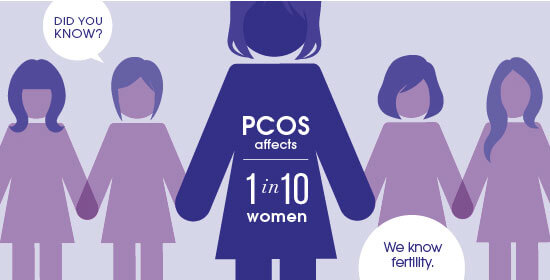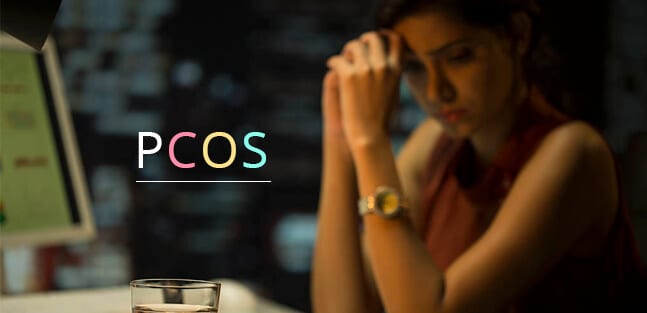PCOS is a hormonal disorder found in women that leads to the growth of many cysts in their ovaries. PCOS can cause problems with menstrual cycles, fertility, weight gain, excessive hair growth, and acne. It is also a leading cause of infertility in women.
Millions of women with PCOS go undiagnosed, untreated and unsupported as the knowledge of the condition and its management is lacking. It has to be first understood and then managed accordingly.
Are you ignoring PCOS? Don’t. Understand it to fight it. Let us help you maintain PCOS naturally through diet plans. To know more, discuss it with a Possible Nutritionist for FREE.
Common PCOS Symptoms
PCOS symptoms and signs often begin soon after a woman first begins having periods (menarche). In some cases, PCOS develops later during the reproductive years, for instance, in response to substantial weight gain.
What are the Signs & PCOS Symptoms?
Although the PCOS symptoms vary for different individuals, the most common symptoms are:
- Fatigue: Many people with PCOS report increased fatigue and substantial low energy. Sleep deprivation contributes to the feeling of fatigue.
- Unwanted Hair Growth: Unwanted hair growth is also known as hirsutism is caused by the hormonal changes in androgens. Areas which are affected are the face, arms, back, chest, thumbs, toes and abdomen.
- Pelvic Pain: Pelvic pain may occur with periods, along with massive heavy bleeding. But in some cases, it might occur when the person isn’t bleeding too.
- Headaches: People diagnosed with PCOC might experience headaches due to hormonal changes.
- Infertility: PCOS is the leading cause of female infertility. However, not all woman with PCOS is the same. Some people will need the assistance of fertility treatments whereas others can conceive naturally.
- Acne: Acne is caused due to the hormonal changes related to androgens. Other related skin problems are darkened patches of skin.
- Mood Changes: Mood swings, depression, and anxiety are common with patients with PCOS
- Thinning hair on the head: Hair loss related to PCOS may increase when you reach your middle age.
- Sleep Problems/Insomnia: PCOS people often complain about insomnia or poor sleep. There are other factors which affect sleep, but PCOS is linked to sleep disorder called sleep apnea. With sleep apnea, a person will stop breathing for a short period of time during sleep.
- Weight Gain: People with PCOS are prone to extreme weight gain and obesity that is difficult to manage.
Click here to know more about what do PCOS symptoms look like!
6 Diet Tips for PCOS
Diet and lifestyle changes are two important factors in maintaining PCOS. [1] Below are the 6 Diet Tips for PCOS explained elaborately
1. Avoid processed foods
Processed foods are bad for health irrespective of PCOS. That is why it’s time you totally avoid these foods. Instead, you add more high-fibre vegetables, lean proteins and anti-inflammatory foods like turmeric, tomatoes.
2. Include low GI foods
GI is the measure of how quickly a food increases the blood sugar levels and with PCOS, women become more insulin resistant. Thus, low GI foods help in maintaining blood sugar levels because they raise sugar levels very slowly.
Hence, include more and more low GI foods into your diet. Low GI foods are like whole fruits and vegetables, whole grains, lean protein and healthy fats. Again, following a low GI diet has shown menstrual regularity in women. [3]
3. Drink enough water
It is very important to drink enough water in general as well as while having PCOS. PCOS is a condition where the woman’s body undergoes many hormonal changes.
Drinking the required amount of water helps to calm down these imbalances. You can have honey with warm water in the morning, this helps in dealing with PCOS. Try to drink 2-3 litres of water a day.
4. Avoid alcohol
Alcohol messes up hormones in women big time. Many cocktails are high in sugar and as we know women with PCOS already have high blood sugar levels. Alcohol can even raise estrogen levels. Hence, it is very important to restrict your alcohol consumption under PCOS conditions.
Did you know?
Women with PCOS have higher rates of anxiety and depression than women without the syndrome.
5. Include lean protein
A high protein PCOS diet in women has shown lower androgen levels, which increases under PCOS condition.
Moreover, a high protein diet suppresses the hunger hormone ghrelin, thus making you less hungry with a reduction in insulin levels. Both of these are beneficial for PCOS. Again, a protein diet is always beneficial for weight loss.
6. Don’t starve
The worst mistake you would do while following a PCOS diet is starving or skipping meals. Eating regular meals helps in balancing hormones.
Eating at the right time and not keeping yourself hungry helps in PCOS. To maintain a proper diet plan, have heavy breakfasts and smaller dinners.
In fact, studies show that with fulfilling breakfasts women show improved fertility. [4] Looking for PCOS treatment naturally? Here is an insight into PCOS treatment.
Who is prone to get PCOS?
PCOS is a common health condition affecting 1 in 10 women in India. However, there is an increasing trend predominantly seen in the women of the childbearing age group of 15 to 30 years.
Some estimates show that the incidence rate of PCOS can be as high as 36% among adolescents.
In studies performed in South India and Maharashtra, the prevalence of PCOS (by Rotterdam’s criteria) was reported as 9.13% and 22.5% (10.7% by Androgen Excess Society criteria) respectively. [1]

Did you know?
Less than 50% of women are properly diagnosed, leaving millions of women living with PCOS undiagnosed.
4 Probable Causes of PCOS
There are different factors which contribute to PCOS, 4 of the most common causes of PCOS are below.
- Family History/ Genetic: Female relatives (daughters and sisters) of women with PCOS have up to 50% chance of having PCOS. Type 2 diabetes is also common in families of those who are diagnosed with PCOS.
- High Levels of Androgens: Also called ‘male hormones’, they are the reason for having male traits such as male pattern baldness. Women with PCOS have more androgens than normal. If a woman has more androgen than normal, then it prevents the ovaries from releasing an egg during each menstrual cycle thus causing extra hair growth and acne, two major signs of PCOS.
- Insulin Resistance & Lifestyle: The main function of insulin is to keep the levels of glucose in the blood from rising after eating. If your body resists insulin, then there is more raise of insulin and these high levels of insulin produce more androgens such as testosterone in the ovaries. This contributes to excessive hair growth and acne.
- Weight: If someone is obese, it worsens insulin resistance and is the symptoms of PCOS. A healthy lifestyle and nutritious food and physical activity can help patients in treating PCOS.
Did you know?
Many studies suggest that genes predispose a woman to PCOS. Women whose mother or sister have this condition have up to a 50% chance of getting PCOS. [6]
PCOS Diet
If you are suffering from PCOS, diet plays an important role in the management of PCOS. Women with PCOS are observed to have vitamin D deficiency. Include a healthy diet consisting of vitamin C-rich foods, green leafy veggies, fruits, organic meat and much more.
Watch the video to know more about the simple diet tips for women suffering from PCOS.
In order to maintain the right diet for PCOS here’s a checklist from Possible’s Nutrition experts. Make the most of it.
Obesity causes PCOS or PCOS is caused by Obesity?
This isn’t clear yet. Usually, women with PCOS produce high levels of insulin that directly bring weight gain. Again, women who are obese or overweight are found to carry higher risks of developing PCOS. [5]

Insulin resistance is one of the main reasons for weight gain because it results in the deposition of sugar in the bloodstream. These are then biochemically converted into fat and stored in the lower abdomen, buttocks, and thigh area.
Not only obese women but also those with non-obese BMI but higher waist to hip ratio (WHR) are also susceptible to this metabolic disorder. And to maintain weight choosing the right PCOS diet is crucially important.
Did you know?
In PCOS, women find it very difficult to lose weight due to their low metabolism and it has been mentioned in the book
“Insulin Resistance: Insulin Action and its Disturbances in Disease”
that it only takes a modest amount of weight loss of 5-10% of initial body weight that can bring useful improvements in insulin resistance, which can be achieved naturally through a well planned PCOS diet.
So do not lose hope, lose weight with a well planned PCOS diet instead, to manage PCOS symptoms effectively.
For more healthy lifestyle tips and guidance, contact our Possible Nutritionist today. The first consultation is on us!

The last section where you have mentioned about insulin resistance is the main reason to put on weight , this causes low metabolism and deposition of fat on the lower abdomen, buttocks and thigh area . This is exactly a problem with me . I have put on weight in these areas and very difficult to lose. Earlier i have lost 15kgs with diet and yoga after my kids have born . But so many years i have put on again and now it is difficult to reduce. Please help.
Hi Manisha,
You have come to the right place. Developing an insulin resistance give the body the perfect conditions to gain weight. You can go for Truweight’s customised weight loss program in which you will get a personalised nutritionist who will guide you to lose weight despite PCOS or insulin resistance, For more details please contact at 08064514959. Our representative will get in touch with you, ASAP. 🙂
Thanks for sharing
Amazing! information shared,
Though i would like to address one most common issue that most women undergoing PCOS treatment ask is, can get pregnant with PCOS? the answer to this question id a big “YES!”
There is nothing that can stop you from getting pregnant, just follow the medication and diet plan as prescribed by your doctor and you will do fine.
Hi! Thank you, these 6 diet tips will help you to fight with PCOS and also thank you for sharing the additional information. Keep following our blog to know more health information.